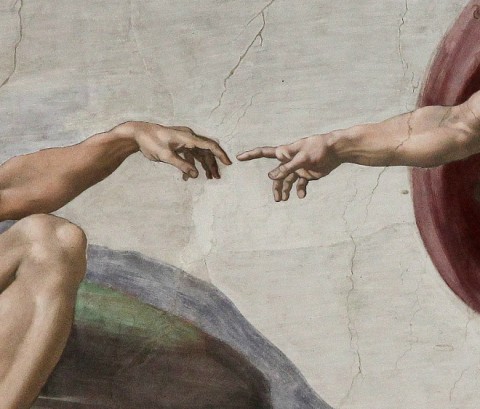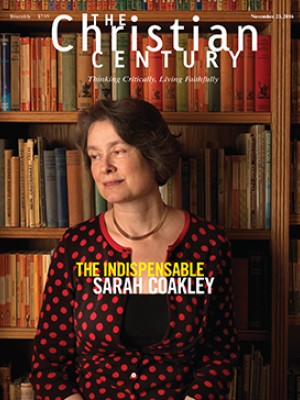I and thou and ze?
Self-realization is possible only in relation to a reality beyond the self.

“What religion do you identify as?” one of my students asked me the other day. To answer in the stated terms—“I identify as a Christian”—would be to wear my identity too lightly. To say “I am a Christian” has greater existential weight; but God help me if, having made such a profession, I cannot carry the weight.
“What are your preferred pronouns?” I heard one student ask another. I am a grammatical traditionalist, but I appreciate the idealism behind this question, the generous willingness to embrace whatever self-presentation another person might elect.
Read our latest issue or browse back issues.
My students say such things out of sensitivity to others. In the instances I’ve observed, it’s not a case of narcissistic identity politics gone mad, as some media pundits would have it. But the “identify as” wording does reflect a pervasive unease. We’ve lost our bearings on a fundamental question about human nature. We’re told, on the one hand, that identity is a fact we are born with, written in our genes; on the other, that identity is endlessly open to revision, written on the water. These two notions are in conflict, and we’re uncertain how to negotiate a truce between them. The virtue of notion one—identity conceived as fixed—is that it encourages loyalty to one’s kind; its characteristic vice is exclusion. The virtue of notion two—identity conceived as fluid—is that it encourages self-awareness and capacity for change; its characteristic vice is anomie.
Ideally, we should be able to make a synthesis of these two conceptions, discriminating the virtues from the vices on each side. It should be possible to affirm the moral freedom and plasticity to remake oneself without denying what are the givens in one’s nature, to affirm one’s identity without closing ranks in polarized communities. But I doubt that this kind of balance and discernment can be attained without a deep anthropological foundation. The human sciences provide essential information about biology and behavior, but for deep anthropology the best place to look is the world’s religions.
It is an impressive fact that all the great religions locate identity in relationship to a reality that transcends the self, a relationship that constitutes the self as both fixed (in its source and ground) and fluid (in its capacity for action and change). The sacred texts of classical Hinduism, for instance, are a chorus of affirmations that the true self—the atman—is eternal, unchanging, and intimately related to the divine; the problem is that we mistake the ego self—the ahamkara (literally, “I-maker”)—for the sovereign atman. To correct this mistaken self-identification is to subdue the passions that poison our social interactions. Classical Buddhism tells us that every time I say “this is me” or “this is mine” I imprison myself in an unreal mental construction, obscuring my awareness of and compassionate engagement with other sentient beings. The Confucian tradition tells us that identity is constituted by relationships that are fixed according to social norms, yet rendered fluid and gracious by acts of self-emptying mutual regard.
For Jews, Christians, and Muslims, identity is a gift and a calling. We are creatures before we are anything else, fragile and corruptible yet made for a reason, with a unique part to play in the working out of the divine plan. Vocation—such a beautiful word—runs deeper than the usual identity markers. Vocation is fixed from the moment of conception (“before I formed you in the womb, I knew you”), and it is here, if anywhere, that our personality find its stable center. Yet vocation is also fluid, telic, oriented toward change (“no longer I who live, but Christ who lives in me”).
Do I identify as a mother? No, I am a mother, and I believe this fact is my vocational identity, even though it might conceivably not have come to pass. Do I identify as Christian? I can only hope for the grace to say I am and at the end of days to be received as such. My preferred pronouns? I would rather dispense with the third person altogether than adopt they as a singular pronoun, or ze and zir, or the like. My preferred pronouns are “you and I” and “we and us.” God’s preferred pronoun? Thou.
It’s no accident that when Augustine’s Confessions, the first truly self-revealing autobiography, burst forth “like lightning from a clear sky” (as the saying goes), it took the form of a dialogue, I and Thou, rather than a third-person account. Years ago a friend of mine tried to make the Confessions more accessible to undergraduates by rendering second-person passages in third-person English; the experiment, he admitted, was a failure, for it diverted attention from the depths of Augustine’s dialogue with God to the shallows of debate about gendered pronouns.
It’s hard enough to be a human being. If the world’s religions are right, self-realization is possible only in relationship to a reality beyond the self. Where personal existence is conceived as a transcendent calling, where relationship is genuine, where traditional language is honored and adapted rather than overwritten in haste, our most neuralgic identity worries lose their sting.
A version of this article appears in the November 23 print edition under the title “Identity as a calling.”





